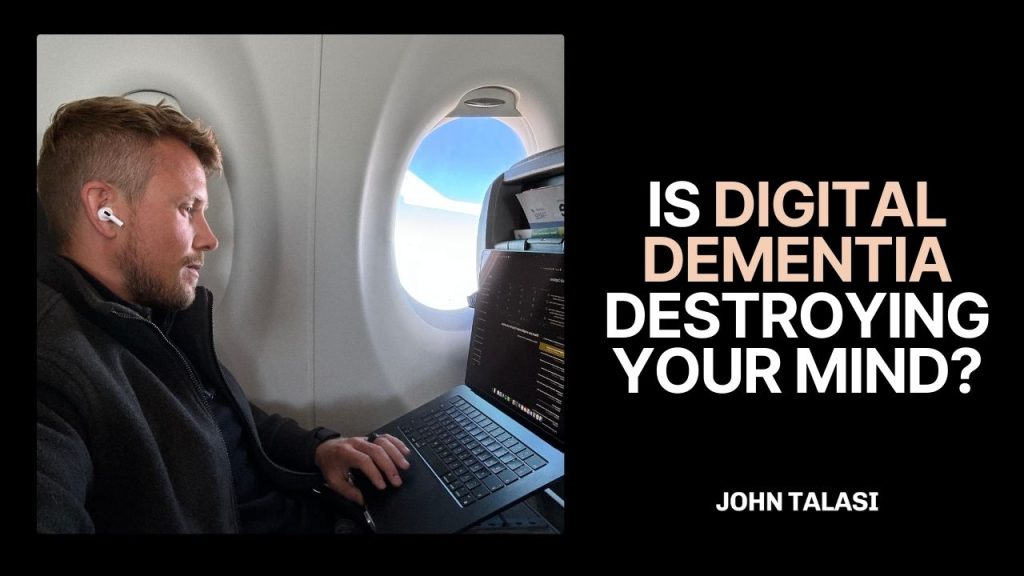In this article
Prevent Digital Dementia From Destroying Your Focus
As our reliance on digital devices grows, an alarming new term has emerged: digital dementia. It’s been suggested that digital dementia is responsible for multiple cognitive issues, from short term memory loss, to feeling unable to focus and concentrate.
Being glued to our digital devices might be disrupting our health – but it’s not the devices themselves that are causing the problem. It’s the overuse and over-reliance on our digital devices, which appears to be impacting our cognitive functioning the most.
Becoming aware of how to prevent this new disease of the modern age, learning how to spot the early warning signs, and understanding how to cultivate a healthier relationship with technology is essential if we want to protect our mental health.

Key Takeaways
- Our use of digital devices could be causing accelerated cognitive decline, such as memory loss
- The over-use of our screens is the suggested cause of digital dementia
- Using our devices in healthier ways is one key way to prevent the onset of digital dementia
What is Digital Dementia (and is it a real disease)?
The term ‘digital dementia’ came from German neuroscientist Manfred Spitzer, who warned that our over-reliance on smartphones and computers, could lead to memory problems and cognitive decline in younger individuals.
Traditionally, dementia is associated with neurodegenerative diseases like Alzheimer’s, which typically impact adults over the age of 65. However, digital dementia is concerning because it mimics these symptoms in much younger age groups, starting even as early as the teenage years.
This is maybe unsurprising; seeing as Gen-Z typically spends on average 9 hours per day on screens.
Is Digital Dementia A Real Disease?
While digital dementia itself isn’t (yet) classified as a clinical disorder, recent research shows that extended use of digital technology can change how the brain processes and stores information.
A 2020 Kings College study showed that when we outsource memory functions (like phone numbers, addresses, or even daily tasks) to our devices, the brain’s ability to retain that information decreases.
A striking example is the decline in working memory, which impacts how well we perform tasks. A report from the Global Mobile Consumer Survey found that the average person checks their phone 58 times a day.
By over-relying on our devices to store facts and data, we underuse parts of our brain responsible for memory and decision-making.
Our over-reliance on digital tools is leading to cognitive laziness, where we are no longer challenging our brains to remember or process information.
What Are the Signs and Symptoms of Digital Dementia?
Digital dementia presents in various ways, many of which are eerily similar to early-stage Alzheimers, or other forms of cognitive decline. However, unlike traditional dementia, these symptoms are triggered by lifestyle rather than aging or disease processes.
One of the earliest signs is short-term memory loss. Many individuals notice they can no longer recall simple information—like phone numbers, birthdays, or appointments—because they rely on their devices to do it for them.
(According to a survey conducted by Kaspersky Lab, 71% of people can no longer remember their children’s phone numbers).
Short term memory loss is one of the key warning signs that could indicate the onset of digital dementia, but there are other signs to watch out for.
Common Symptoms Of Digital Dementia
- Poor concentration and attention span. The average attention span in humans has dropped from 12 seconds in 2000 to just 8 seconds, according to a 2021 Microsoft study. This is shorter than a goldfish’s attention span! The constant bombardment of notifications and easy access to quick entertainment trains the brain to become distracted.
- Mental fog and confusion. Many people report difficulty focusing on tasks for extended periods without distraction, a phenomenon known as “continuous partial attention.” Multitasking, is now known to reduce cognitive performance -studies show that switching between tasks can lead to a 40% decrease in productivity.
- Sleep disturbances. The blue light emitted by screens disrupts the body’s production of melatonin, the hormone responsible for sleep regulation. A 2022 study by the Sleep Foundation found that people who use digital devices before bed are 70% more likely to suffer from insomnia or poor sleep quality.
- Emotional instability. Increased screen time can lead to anxiety, depression, and low self-esteem. Dr. Gary Small, a neuroscientist at UCLA, has pointed out that excessive internet use can rewire brain pathways, making individuals more prone to stress and emotional burnout.
The combined impact of these symptoms can have serious consequences, affecting productivity, relationships, and overall quality of life.
How to Prevent Digital Dementia
The prevention of digital dementia focuses on reducing screen time, rebuilding cognitive skills, and adopting healthier habits.
Becoming more aware and mindful of our screen use can be key in preventing digital dementia.
1. Digital Detox
One of the most effective ways to combat digital dementia is to disconnect from technology periodically. Start with a simple break—no devices during meals or for an hour before bed. This allows the brain to rest and reset.
2. Practice Mindfulness And Meditation
Practicing mindfulness helps to regain focus and improve attention span. According to a 2019 study published in Frontiers in Psychology, mindfulness training can significantly improve working memory, concentration, and cognitive flexibility.
Regular meditation practices also reduce stress and anxiety, two key contributors to digital dementia.
3. Exercise Your Brain
Engaging in activities that challenge memory and problem-solving skills can help reverse the effects of cognitive decline. Games like chess, puzzles, and even learning a new language stimulate the brain.
4. Limit Multitasking
Despite the modern world’s encouragement of multitasking, this habit harms cognitive function. Research shows that focusing on one task at a time not only improves efficiency but also helps strengthen neural connections in the brain, according to a Stanford University study.
5. Physical Exercise
Physical Exercise. Regular physical activity has a positive impact on brain health. Studies have shown that exercise increases the size of the hippocampus, the area of the brain responsible for memory.
6. Healthy Sleep Hygiene
Improving sleep quality by reducing screen time before bed and creating a restful environment can have significant benefits for cognitive function.
Is Digital Dementia Reversible?
One of the more hopeful aspects of digital dementia is that, unlike most classified neurodegenerative diseases, it is largely reversible.
Since digital dementia is caused by lifestyle factors, the easiest way to prevent digital dementia is by becoming more mindful in how we interact not only with our devices, but with our lifestyle choices in general.
How To Treat Digital Dementia
Several studies suggest that with consistent mental and physical activity, combined with a reduction in digital dependency, many of the cognitive impairments linked to digital dementia can be reversed.
A study published in NeuroImage found that after as little as two weeks of limiting screen use and engaging in brain-challenging activities, participants showed improvements in memory and concentration.
Neuroscientist Dr. Manfred Spitzer highlights that the brain has an incredible ability to adapt through neuroplasticity, meaning it can rewire itself to regain lost function.
“The brain is not static; it is malleable. When we reduce our reliance on digital devices and stimulate our brains in more traditional ways, we can reverse many of the effects of digital dementia.”
However, it’s important to note that while the brain can recover, the process is gradual and requires consistent effort.
The Bottom Line
As with most health issues, prevention is better than cure. Being mindful on how long we spend on our devices, and how we use them, appears to be the best way to prevent – and perhaps even treat – digital dementia.
Digital dementia is fast becoming one of the most pressing issues in a world dominated by technology.
Fortunately, by taking proactive steps—such as reducing screen time, practicing mindfulness, and engaging in brain-boosting activities—we can reverse much of the damage and keep our minds sharp.
Who coined the phrase ‘digital dementia’?
The term ‘digital dementia’ came from German neuroscientist Manfred Spitzer, who warned that our over-reliance on smartphones and computers, could lead to memory problems and cognitive decline.
What causes digital dementia?
Recent research shows that extended use of digital technology can change how the brain processes and stores information, which might be leading to cognitive deterioration.
What are digital dementia symptoms?
Typical symptoms of digital dementia are sleep disturbances, poor concentration and attention span, mental fog and confusion, and emotional instability.
How to prevent digital dementia
The prevention of digital dementia focuses on reducing screen time, rebuilding cognitive skills, and adopting healthier habits, such as implementing digital detoxes, practicing mindfulness, and physical exercise.
How to slow down the onset of digital dementia
A combination of reduced screen time, together with increased mental and physical activity, have been shown to effectively improve memory and concentration.
How can I prevent digital distraction?
Digital distraction leads to loss of focus, motivation, and even neurodegenerative slowdown. Limit multi-tasking, practice meditation, and staying fit and healthy can help prevent digital distraction.
Do I need to take a digital detox?
If you’re feeling distracted, unfocussed, and are struggling with sleep disturbances these are signs you might want to consider taking a digital detox.
What age do you usually get digital dementia?
Digital dementia can impact anybody at any age and more recently, has even been seen developing in teenagers.
How to recover from digital dementia?
Digital dementia can be supported by being mindful of your screentime, practicing mindfulness, and taking steps to keep your mind sharp. It will take consistent effort.
Is spending too much time on screens damaging my mental health?
Early research has shown that over use of devices have been linked to memory loss, feeling unfocssed and distracted, and even poor quality sleep.



